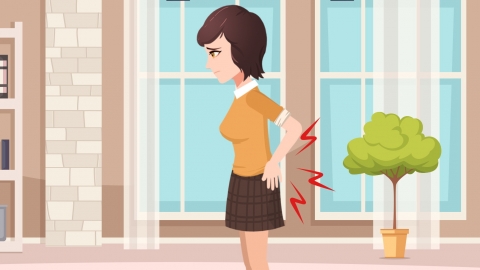What should I do if my lower back is very sore after my period ends?
"Finishing menstruation" generally refers to the end of a menstrual period. If lower back pain becomes particularly severe after menstruation ends, it may be caused by residual pelvic congestion during the menstrual phase, excessive fatigue, lumbar muscle strain, pelvic inflammatory disease, or endometriosis. Symptoms can be improved through rest, heat application, and medication. If the soreness persists for more than one week or is accompanied by fever or abnormal discharge, prompt medical attention is necessary.
1. Residual Pelvic Congestion During Menstruation: During menstruation, the pelvis remains congested with blood. After menstruation ends, this congestion may not have fully subsided, leading to pressure on the nerves in the lower back and resulting in aching pain, which may slightly improve with movement. It is recommended to get adequate rest and apply a hot water bottle to the lower back for 15–20 minutes at a time to promote pelvic blood circulation.
2. Excessive Fatigue: If physical strength has not recovered during or immediately after menstruation, engaging in activities such as bending over, prolonged standing, or heavy labor can lead to strain and soreness in the lower back muscles, which typically improves with rest. It is advisable to reduce physical exertion, avoid prolonged standing or sitting, rest in bed when possible, and gently massage the lower back.

3. Lumbar Muscle Strain: Inadequate warmth or poor posture during menstruation can cause tension and strain in the lower back muscles, leading to soreness after menstruation ends. Pain may become more noticeable when bending or twisting. Follow medical advice to use medications such as diclofenac sodium sustained-release tablets, eperisone hydrochloride tablets, or Huoxue Zhitong capsules to relieve symptoms.
4. Pelvic Inflammatory Disease (PID): Bacterial infection ascending into the reproductive organs can cause pelvic inflammation. After menstruation, inflammatory irritation of surrounding tissues becomes more apparent, manifesting as low back and sacral aching, along with increased vaginal discharge that may have an odor. Under medical guidance, treatment may include cefixime dispersible tablets, metronidazole tablets, or Fuke Qianjin tablets to alleviate symptoms.
5. Endometriosis: When endometrial tissue grows outside the uterus—commonly in the pelvic cavity—it continues to stimulate surrounding tissues even after menstruation ends, causing persistent lower back pain that often worsens with each menstrual cycle. As directed by a physician, medications such as danazol capsules, gestrinone capsules, or ibuprofen sustained-release capsules may be used to manage symptoms.
For daily care, it is important to keep the lower back warm during and after menstruation to prevent chilling, maintain proper sitting and standing posture without slouching, perform appropriate back and core muscle exercises to strengthen support, and eat a balanced diet rich in nutrients to aid recovery.




